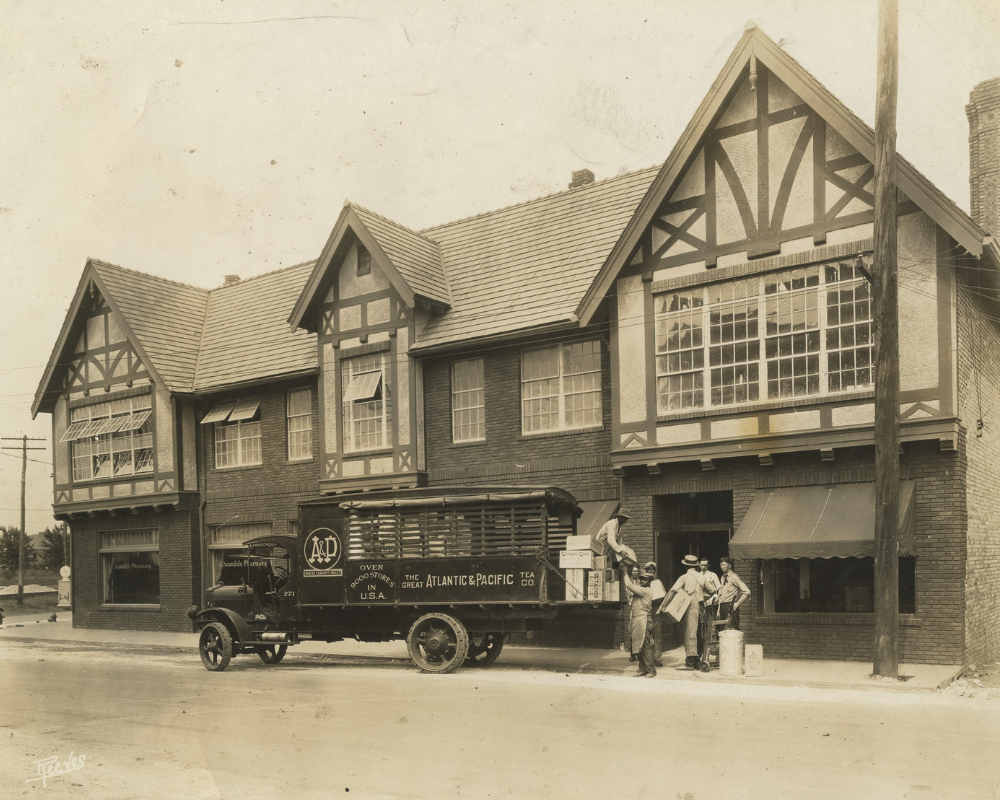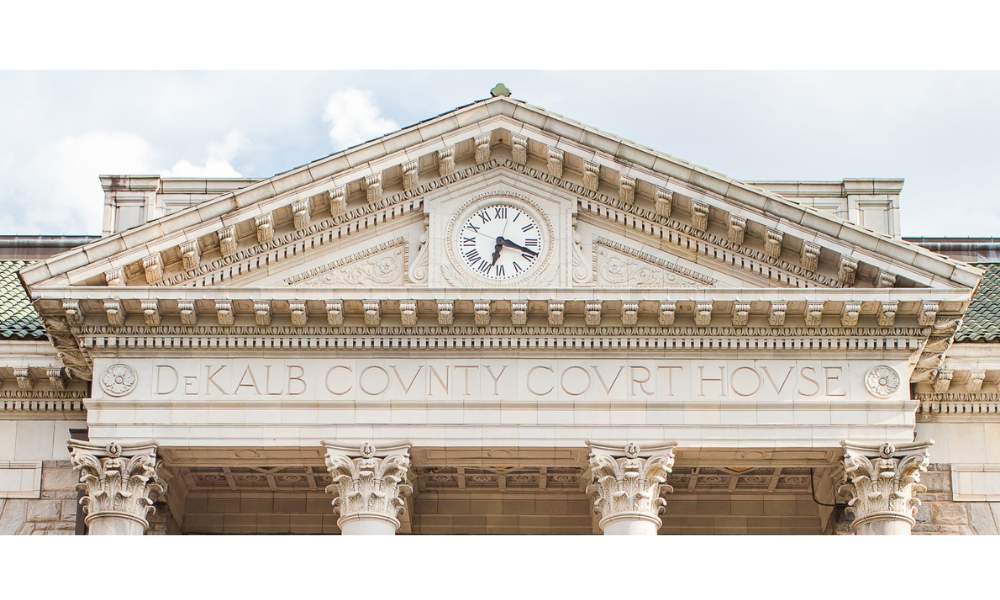America’s ‘Black Mecca:’- Dr. Maurice Hobson
America’s Black Mecca- It’s Complicated.
Featured Image, The Gulch Downtown Atlanta, Guy Hayes Collection, DHC Archives.
The DeKalb History Center was honored to have Dr. Maurice Hobson, an associate professor at Georgia State University, lecture at our July Lunch & Learn about his new book The Legend of Black Mecca. In his talk, Hobson argued that Atlanta’s status as a “Black Mecca’ is complex. Poor African-Americans were disenfranchised by the city’s political elite and were left outside of the city’s prosperity, problematizing common understandings of Atlanta’s racial dynamics.
There is some truth to every legend, but at some point, the story gets embellished. It is only natural as human beings that we expand the truth, stretching it to be more entertaining, to be bolder, to be more than the sum of its parts. Such has been the case with Atlanta’s reputation as a Black Mecca: a place where African-Americans could achieve their economic, social and political goals. Dr. Hobson complicated this idea, stating while this experience has been true for some, it has not been the reality for all.

Dr. Hobson discussed how poor blacks were disproportionately left out of any of the city’s economic gain and were often displaced in efforts to ‘beautify’ the city. Due to this, a schism developed between impoverished blacks and their representatives: the African-American political elites. These leaders often favoured conditions that benefited predominantly white businessman, which “divert[ed] resources, policies, and attention away from the rank and file of black Atlanta and towards the new political machine.”
In 1903, W.E DuBois was prescient, comparing the Atlantic to the mythic figure of Atalanta in the essay “Of the Wings of Atlanta.” Atalanta was a swift runner and could outrun all of her suitors, making her unbeatable in a footrace. One suitor, Hippomenes, who was wily and cunning, consulted an oracle. The oracle conveyed that he should place three golden apples along the route. These distracted Atalanta and she was caught, according to DuBois “his arms fell round her, and looking on each other, the blazing passion of their love profaned the sanctuary of Love, and they were cursed. If Atlanta be not named for Atalanta, she ought to have been.”
Atlanta was “the Queen of the cotton kingdom; Atlanta, Gateway to the Land of the Sun; Atlanta, the new Lachesis, spinner of web and woof for the world… And the Nation talked of her striving.” Yet, as DuBois saw it, the nation was wrongly idealizing the city: Atlanta was focused on greed and wealth, not morality.
Like DuBois, Dr. Hobson’s analysis of why Atlanta gained a reputation for black excellence stems back to the educational system. Historic African-American colleges such as Spelman and Morehouse created a new a new class of African-American professionals who enjoyed increased possibilities, economically and politically. It is from this background that Maynard Jackson emerged. His paternal grandfather was the highest ranking Mason in the state, his mother had finished her PhD in French, and his aunt had graduated from Spelman College.
Dr. Hobson’s historiography challenges ideas of the ‘New Black South,’ the examination of the black experience in a post-Civil Rights legislation period. Dr. Hobson argued passionately against Atlanta’s reputation as a central Civil Rights city. He defines these cities as having “legislation come from it… [i.e] citizenship and voting.” Dr. Hobson pointed to the Civil Rights Act of 1964 which emerged out of Birmingham, and the Voting Rights Act of 1965 that came out of Selma.
In 1968, Maynard Jackson ran against Herman Talmadge, a remnant of the old southern guard, for a Senate seat. While Jackson lost, it demonstrated two key things: first, Maynard Jackson did not need the political kingmakers and secondly, he had overwhelming support from the local black constituency. Successive elections reinforced those paradigms and in 1973, Mr. Jackson became the mayor. Dr. Hobson sees this as “the biggest political gain for African-Americans until 2008 with the election of Barack Obama.”
Dr. Hobson both lauded and critiqued Maynard Jackson’s time as mayor. He perceived Jackson’s primary successes to be: reducing crime, promoting affirmative action for city contracts, the expansion of MARTA, and increasing neighborhood planning. His shortcomings, which Dr. Hobson perceives as a matter of opinion, were: the firing of the sanitation workers and the public perception of how he handled the Atlanta Child Murders.
His successor, Andrew Young, was pushed to be mayor by Maynard Jackson in 1981. His successes included: “his business interactions with the white business elite… he promoted… urban renewal and gentrification, [including] foreign investors… and he was able to secure the 1988 Democratic Convention and the Centennial Games.” Dr. Hobson declared that his failures were that Young had “no plan for Atlanta’s working class and poor, and it was felt by many of Atlanta’s black citizens that he no respect for Atlanta’s public history and culture.”
Atlanta’s successful bid for the Continental Games had a long history. Beginning in 1975, a handball player met with Maynard Jackson and articulated the idea that Atlanta could host the Olympics. Yet, the business interests in Atlanta were resistant. The 1972 Olympic Games in Munich experienced a horrific attack against Israeli athletes by the PLO. The 1976 Olympics were a disaster economically and politically: South African boycotted the games due to Canada’s support for the apartheid regime and left the city in massive debt. In 1980, the United States lead a boycott against the Soviet Union.
Needless to say, these events demonstrated that the Olympics attracted terrorism, debt, and potential political destabilization. Why would Atlanta ever want to host the Olympics?
This dynamic changed with the 1984 Olympic Games in Los Angeles. The privatization of the games left the city with “250 million dollars in surplus [and] Atlanta was watching.” Several key factors aligned: Young had a lifelong fascination with the Olympics and his wife, Jean Childs Young, was the chairwoman for the Year of the Child. The Olympics were framed as a way to help the children, and preparations began in earnest.
On September 18, 1990, the Olympic Committee selected Atlanta as the host city for the Centennial Olympics. The city’s selection was made possible through Maynard Jackson and Andrew Young, and marked a new identity for the city, “a tremendous public relations victory.” Like a snake shedding its skin, Atlanta was no longer defined by the race riots of twenty-five years earlier. It was a new city, reinvented. It was tolerant and metropolitan, a major cultural behemoth on the American stage: Hotlanta.
This resulted in the ‘Olympification’ of Atlanta which, according to Dr. Hobson, “disenfranchises, criminalizes, and demonizes the indigenous people of Atlanta, the people here that are [overwhelmingly] black.”
Ronald Reagan’s policies forced Andrew Young to approach international businesses to reimagine the city. These partners aided in the creation of the Atlanta Circle around the central city. Dr. Hobson views this as a simple way to “take back prime-time real estate to develop Atlanta for the next forty years.” This caused the displacement of 70,000 African-Americans and resulted in substantial cuts in federal support for subsidized housing. The emerging Dirty South sound from OutKast and Goody Mob were a direct critique of how wealth and political opportunity never came trickled down. These issues continue into the present.
Dr. Hobson’s talk traced the development of the Black Mecca ideology, but he also enumerated the reasons why we should examine it critically. This is not to say that African-Americans have not found achievement within the city, but that, like most things, Atlanta’s history is much more complicated and troubling than an initial glance would belie.
Written by Samantha Mooney, Intern





